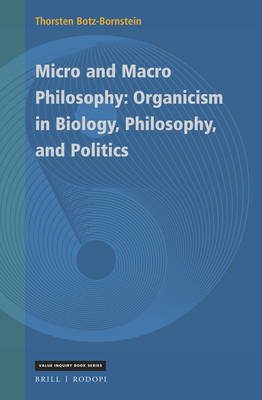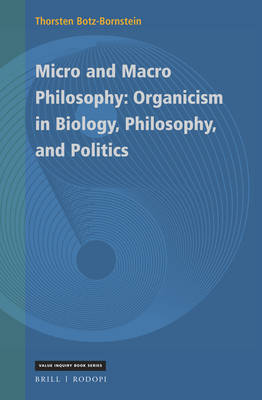
- Afhalen na 1 uur in een winkel met voorraad
- Gratis thuislevering in België vanaf € 30
- Ruim aanbod met 7 miljoen producten
- Afhalen na 1 uur in een winkel met voorraad
- Gratis thuislevering in België vanaf € 30
- Ruim aanbod met 7 miljoen producten
Zoeken
Micro and Macro Philosophy: Organicism in Biology, Philosophy, and Politics
Thorsten Botz-Bornstein
€ 245,95
+ 491 punten
Omschrijving
What role can philosophy play in a world dominated by neoliberalism and globalization? Must it join universalist ideologies as it did in past centuries? Or might it turn to ethnophilosophy and postmodern fragmentation? Micro and Macro Philosophy argues that universalist cosmopolitanism and egocentric culturalism are not the only alternatives. Western philosophy has created a false dichotomy. A better solution can be found in an organic philosophy that functions through micro-macro interactions. According to biologists, the twentieth century was the century of the gene, while the twenty-first century is destined to be the century of the organic. Micro and Macro Philosophy attempts to establish such a view in philosophy: by highlighting micro-macro patterns found in history, it seeks to design new ways of "organic thinking" in the human sciences.
Specificaties
Betrokkenen
- Auteur(s):
- Uitgeverij:
Inhoud
- Aantal bladzijden:
- 230
- Taal:
- Engels
- Reeks:
- Reeksnummer:
- nr. 353
Eigenschappen
- Productcode (EAN):
- 9789004439078
- Verschijningsdatum:
- 29/10/2020
- Uitvoering:
- Hardcover
- Formaat:
- Genaaid
- Afmetingen:
- 155 mm x 235 mm
- Gewicht:
- 510 g

Alleen bij Standaard Boekhandel
+ 491 punten op je klantenkaart van Standaard Boekhandel
Beoordelingen
We publiceren alleen reviews die voldoen aan de voorwaarden voor reviews. Bekijk onze voorwaarden voor reviews.








